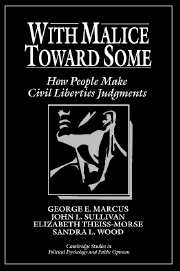Book contents
- Frontmatter
- Contents
- List of Figures and Tables
- Preface: Political Tolerance and Democratic Life
- PART I Theoretical Background and Overview
- 1 Political Tolerance and Democratic Practice
- 2 Antecedent Considerations and Contemporary Information
- 3 Thinking and Mood
- PART II Contemporary Information and Political Tolerance Judgments
- PART III Refining the Model – The Role of Antecedent Considerations as Individual Differences
- PART IV Implications and Conclusions
- Appendix A: Hypothetical Group Scenarios and Manipulations
- Appendix B: Methodological Approaches and Scales
- Notes
- References
- Index
1 - Political Tolerance and Democratic Practice
Published online by Cambridge University Press: 05 August 2012
- Frontmatter
- Contents
- List of Figures and Tables
- Preface: Political Tolerance and Democratic Life
- PART I Theoretical Background and Overview
- 1 Political Tolerance and Democratic Practice
- 2 Antecedent Considerations and Contemporary Information
- 3 Thinking and Mood
- PART II Contemporary Information and Political Tolerance Judgments
- PART III Refining the Model – The Role of Antecedent Considerations as Individual Differences
- PART IV Implications and Conclusions
- Appendix A: Hypothetical Group Scenarios and Manipulations
- Appendix B: Methodological Approaches and Scales
- Notes
- References
- Index
Summary
I think, therefore I am.
Rene Descartes (1596–1650)The heart has its reasons which reason knows nothing of.
Blaise Pascal (1623–62)Tolerance is the pivotal dilemma of democracy in a pluralistic society. Political tolerance requires that democratic citizens and leaders secure the full political rights of expression and political participation of groups they find objectionable (Sullivan, Piereson, & Marcus, 1982). We maintain that the challenge of sustaining a politically tolerant society is enduring. However, while intolerance is an ever-present danger, it need not simply be accepted. To understand how to confront intolerance, we must understand how people react when faced with groups and ideas they find threatening. In this book, we will present an explanation for how people meet that challenge.
McClosky and Brill (1983) suggest that political intolerance may be more “natural” than tolerance:
The ubiquity of slavery and oppression throughout human history leads one to wonder whether intolerance rather than tolerance may be the easier and more natural posture for most people to assume. … If one has sufficient strength and cunning to repel the enemy, one is inclined to do so unless one has discovered that, for some reason, another type of response is legally or socially required, or preferred, (p. 13)
Some research suggests that intolerance may be cognitively easier for people than tolerance in part because of the ease with which people acquire stereotypes and prejudices about individuals and groups who differ from themselves (Aboud, 1988; Devine, 1989).
- Type
- Chapter
- Information
- With Malice toward SomeHow People Make Civil Liberties Judgments, pp. 3 - 14Publisher: Cambridge University PressPrint publication year: 1995

